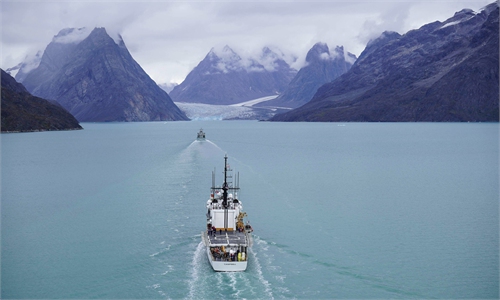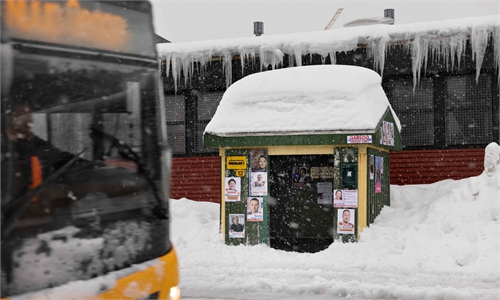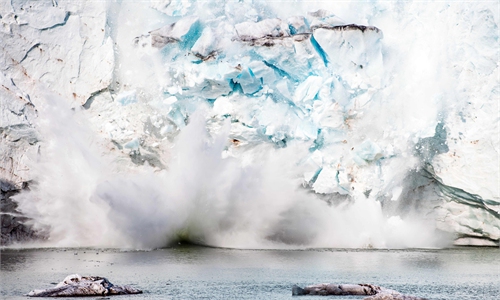Even without any future global warming, Greenland's melting ice sheet will cause major sea level rise, with potentially "ominous" implications over this century as temperatures continue to rise, according to a study published on Monday.
Rising sea levels - pushed up mainly by melting ice sheets on Greenland and Antarctica - are set to redraw the map over centuries and could eventually swamp land currently home to hundreds of millions of people, depending on humanity's efforts to halt warming.
The Greenland ice sheet is currently the main factor in swelling the Earth's oceans, according to NASA, with the Arctic region heating at a faster rate than the rest of the planet.
In the new study, published in Nature Climate Change, glaciologists found that regardless of any future fossil fuel pollution, warming to date will cause the Greenland ice sheet to shed 3.3 percent of its volume, committing 27.4 centimeters to sea level rise.
While the researchers were not able to give an exact timeframe, they said most of it could happen by 2100 - meaning that current modeled projections of sea level rise could be understating the risks this century.
The "shocking" results are also a lowest estimate because they do not take future warming into account, said lead author Jason Box, of the National Geological Survey of Denmark and Greenland.
"It's a conservative lower bound. The climate has only to continue warming around Greenland for more commitment," he told AFP.
If the high levels of melting seen in 2012 became an annual occurrence, the study estimated sea level rise could be around 78 centimeters, enough to swamp swathes of low-lying coastlines and supercharge floods and storms.
This should serve "as an ominous prognosis for Greenland's trajectory through a 21st century of warming," the authors said.
In a landmark report on climate science in 2021, the Intergovernmental Panel on Climate Change said the Greenland ice sheet would contribute up to 18 centimeters to sea level rise by 2100 under the highest emissions scenario.
Box, who was an author on that report, said his team's latest research suggests those estimates could be "too low."
Instead of using computer models, Box and colleagues used two decades of measurements and observational data to predict how the Greenland ice sheet will adjust to warming already experienced.
Upper areas of the ice sheet adds mass through snowfall every year, but since the 1980s the territory has been running an ice "budget deficit," which sees it lose more ice than it gains through surface melting and other processes.
Rising sea levels - pushed up mainly by melting ice sheets on Greenland and Antarctica - are set to redraw the map over centuries and could eventually swamp land currently home to hundreds of millions of people, depending on humanity's efforts to halt warming.
The Greenland ice sheet is currently the main factor in swelling the Earth's oceans, according to NASA, with the Arctic region heating at a faster rate than the rest of the planet.
In the new study, published in Nature Climate Change, glaciologists found that regardless of any future fossil fuel pollution, warming to date will cause the Greenland ice sheet to shed 3.3 percent of its volume, committing 27.4 centimeters to sea level rise.
While the researchers were not able to give an exact timeframe, they said most of it could happen by 2100 - meaning that current modeled projections of sea level rise could be understating the risks this century.
The "shocking" results are also a lowest estimate because they do not take future warming into account, said lead author Jason Box, of the National Geological Survey of Denmark and Greenland.
"It's a conservative lower bound. The climate has only to continue warming around Greenland for more commitment," he told AFP.
If the high levels of melting seen in 2012 became an annual occurrence, the study estimated sea level rise could be around 78 centimeters, enough to swamp swathes of low-lying coastlines and supercharge floods and storms.
This should serve "as an ominous prognosis for Greenland's trajectory through a 21st century of warming," the authors said.
In a landmark report on climate science in 2021, the Intergovernmental Panel on Climate Change said the Greenland ice sheet would contribute up to 18 centimeters to sea level rise by 2100 under the highest emissions scenario.
Box, who was an author on that report, said his team's latest research suggests those estimates could be "too low."
Instead of using computer models, Box and colleagues used two decades of measurements and observational data to predict how the Greenland ice sheet will adjust to warming already experienced.
Upper areas of the ice sheet adds mass through snowfall every year, but since the 1980s the territory has been running an ice "budget deficit," which sees it lose more ice than it gains through surface melting and other processes.



